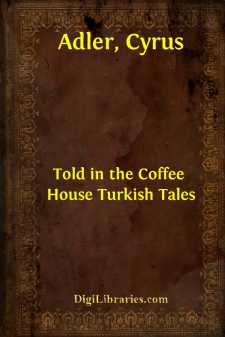Categories
- Antiques & Collectibles 13
- Architecture 36
- Art 48
- Bibles 22
- Biography & Autobiography 813
- Body, Mind & Spirit 142
- Business & Economics 28
- Children's Books 17
- Children's Fiction 14
- Computers 4
- Cooking 94
- Crafts & Hobbies 4
- Drama 346
- Education 46
- Family & Relationships 57
- Fiction 11829
- Games 19
- Gardening 17
- Health & Fitness 34
- History 1377
- House & Home 1
- Humor 147
- Juvenile Fiction 1873
- Juvenile Nonfiction 202
- Language Arts & Disciplines 88
- Law 16
- Literary Collections 686
- Literary Criticism 179
- Mathematics 13
- Medical 41
- Music 40
- Nature 179
- Non-Classifiable 1768
- Performing Arts 7
- Periodicals 1453
- Philosophy 64
- Photography 2
- Poetry 896
- Political Science 203
- Psychology 42
- Reference 154
- Religion 513
- Science 126
- Self-Help 84
- Social Science 81
- Sports & Recreation 34
- Study Aids 3
- Technology & Engineering 59
- Transportation 23
- Travel 463
- True Crime 29
Told in the Coffee House Turkish Tales
by: Cyrus Adler
Categories:
Description:
Excerpt
HOW THE HODJA SAVED ALLAH
ot far from the famous Mosque Bayezid an old Hodja kept a school, and very skilfully he taught the rising generation the everlasting lesson from the Book of Books. Such knowledge had he of human nature that by a glance at his pupil he could at once tell how long it would take him to learn a quarter of the Koran. He was known over the whole Empire as the best reciter and imparter of the Sacred Writings of the Prophet. For many years this Hodja, famed far and wide as the Hodja of Hodjas, had taught in this little school. The number of times he had recited the Book with his pupils is beyond counting; and should we attempt to consider how often he must have corrected them for some misplaced word, our beards would grow gray in the endeavor.
Swaying to and fro one day as fast as his old age would let him, and reciting to his pupils the latter part of one of the chapters, Bakara, divine inspiration opened his inward eye and led him to pause at the following sentence: "And he that spends his money in the ways of Allah is likened unto a grain of wheat that brings forth seven sheaves, and in each sheaf an hundred grains; and Allah giveth twofold unto whom He pleaseth." As his pupils, one after the other, recited this verse to him, he wondered why he had overlooked its meaning for so many years. Fully convinced that anything either given to Allah, or in the way that He proposes, was an investment that brought a percentage undreamed of in known commerce, he dismissed his pupils, and putting his hand into his bosom drew forth from the many folds of his dress a bag, and proceeded to count his worldly possessions.
Carefully and attentively he counted and then recounted his money, and found that if invested in the ways of Allah it would bring a return of no less than one thousand piasters.
"Think of it," said the Hodja to himself, "one thousand piasters! One thousand piasters! Mashallah! a fortune."
So, having dismissed his school, he sallied forth, his bag of money in his hand, and began distributing its contents to the needy that he met in the highways. Ere many hours had passed the whole of his savings was gone. The Hodja was very happy; for now he was the creditor in Allah's books for one thousand piasters.
He returned to his house and ate his evening meal of bread and olives, and was content.
The next day came. The thousand piasters had not yet arrived. He ate his bread, he imagined he had olives, and was content.
The third day came. The old Hodja had no bread and he had no olives. He suffered the pangs of hunger. So when the end of the day had come, and his pupils had departed to their homes, the Hodja, with a full heart and an empty stomach, walked out of the town, and soon got beyond the city walls.
There, where no one could hear him, he lamented his sad fate, and the great calamity that had befallen him in his old age.
What sin had he committed? What great wrong had his ancestors done, that the wrath of the Almighty had thus fallen on him, when his earthly course was well-nigh run?
"Ya! Allah! Allah!" he cried, and beat his breast.
As if in answer to his cry, the howl of the dreaded Fakir Dervish came over across the plain. In those days the Fakir Dervish was a terror in the land. He knocked at the door, and it was opened. He asked, and received food. If refused, life often paid the penalty.
The Hodja's lamentations were now greater than ever; for should the Dervish ask him for food and the Hodja have nothing to give, he would certainly be killed.
"Allah! Allah! Allah! Guide me now. Protect one of your faithful followers," cried the frightened Hodja, and he looked around to see if there was any one to rescue him from his perilous position....


